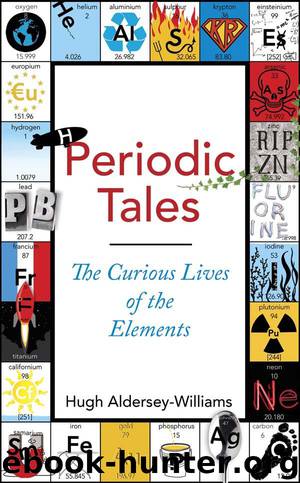Periodic Tales by Aldersey-Williams Hugh

Author:Aldersey-Williams, Hugh [Aldersey-Williams, Hugh]
Language: eng
Format: mobi, azw3
ISBN: 9780670918119
Publisher: ePenguin
Published: 2011-02-02T16:00:00+00:00
Shakespeare recodes lead’s predictive potential in The Merchant of Venice. In order to win the beautiful heiress Portia, her suitors must make an elemental choice between caskets of gold, silver and lead. Each casket bears an inscription. The inscriptions on the precious-metal caskets make promises that seem deliverable in some material form even if they are enigmatically stated. The golden casket is inscribed: ‘Who chooseth me shall gain what many men desire’, the silver: ‘Who chooseth me shall get as much as he deserves’. The inscription on the lead casket recognizes only the uncertain world: ‘Who chooseth me must give and hazard all he hath’. To choose lead now is acknowledgement that fortunes may not be told at all.
The first two suitors to appear in the play, whom Portia calls ‘deliberate fools’, are the princes of Morocco and Arragon. They judge that they cannot afford life’s gamble; they prefer what is clearly a trade, even if the terms aren’t clear. Vain Morocco chooses the gold, calculating Arragon the silver. The worthy suitor Bassanio rationalizes the choice differently. In a ‘world still deceiv’d with ornament’ he rejects both gold and silver and chooses the lead casket, opening it to find ‘Fair Portia’s counterfeit’, the sign that he has won her.
All three suitors have been guided in their choice by their perceptions of the respective metals’ worth. During the course of their deliberations, the men have called lead ‘dull’, ‘base’ and ‘meagre’ in turn, although Portia has been scrupulous in never assigning value to any of the metals. Morocco and Arragon allow the accompanying riddles to compound their confusion, but Bassanio, so far as we can tell, does not read the messages at all. His choice is corporeal. Morocco and Arragon are offended by the ordinariness of lead but Bassanio is undeterred.
Fortunes may not be for telling, but one thing in life can be foretold all too well. What Bassanio has won he knows too that he will ultimately lose. His correct choice indicates an acceptance of mortality – both his own and Portia’s too. The lead of the casket has already spelt this out to all comers, as Morocco makes plain when he piously announces he cannot bear to ‘think so base a thought’ that Portia’s portrait should be sheathed in lead in prevision of her death. Bassanio’s paradox is that, while he desires the beautiful Portia, he can nevertheless confess of the leaden casket: ‘Thy plainness moves me more than eloquence’. Lead’s dull truth is that beauty fades. Time corrodes our bodies, our skin acquires its own oxide coating, but the soul may be kept pure within. The choice of the lead casket embraces this inevitability, showing that Bassanio will be a steadfast husband unto death. ‘In this way,’ wrote Freud in an essay on mythic three-way choices, ‘man overcomes death, which he has recognized intellectually.’
‘You that choose not by the view,’ runs the scroll Bassanio finds inside the lead casket, ‘Chance as fair and choose as true! / Since this fortune falls to you, / Be content and seek no new.
Download
This site does not store any files on its server. We only index and link to content provided by other sites. Please contact the content providers to delete copyright contents if any and email us, we'll remove relevant links or contents immediately.
Quantitative and Pattern Recognition Analyses of Five Marker Compounds in Raphani Semen using High-Performance Liquid Chromatography by Unknown(4127)
Alchemy and Alchemists by C. J. S. Thompson(3502)
The Elements by Theodore Gray(3039)
The Club by A.L. Brooks(2909)
How to Make Your Own Soap by Sally Hornsey(2881)
Drugs Unlimited by Mike Power(2580)
Wheels of Life by Anodea Judith(2128)
Cracking the LSAT, 2012 Edition by Princeton Review(1932)
Cracking the Sat French Subject Test, 2013-2014 Edition by The Princeton Review(1863)
Perfume by Jean-Claude Ellena(1810)
The Flavor Matrix by James Briscione(1808)
The Cosmic Machine: The Science That Runs Our Universe and the Story Behind It by Scott Bembenek(1748)
MCAT Physics and Math Review by Princeton Review(1675)
The Thing Around Your Neck by Chimamanda Ngozi Adichie(1674)
1000 Multiple-Choice Questions in Organic Chemistry by Organic Chemistry Academy(1647)
Cracking the SAT Premium Edition with 6 Practice Tests, 2017 by Princeton Review(1575)
Handbook of Modern Sensors by Jacob Fraden(1567)
Synchrotron Light Sources and Free-Electron Lasers by Eberhard J. Jaeschke Shaukat Khan Jochen R. Schneider & Jerome B. Hastings(1543)
A is for Arsenic: The Poisons of Agatha Christie (Bloomsbury Sigma) by Kathryn Harkup(1532)
